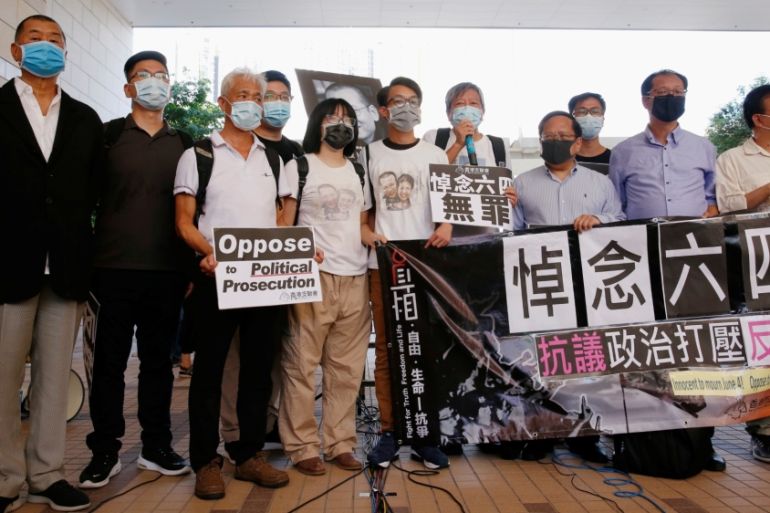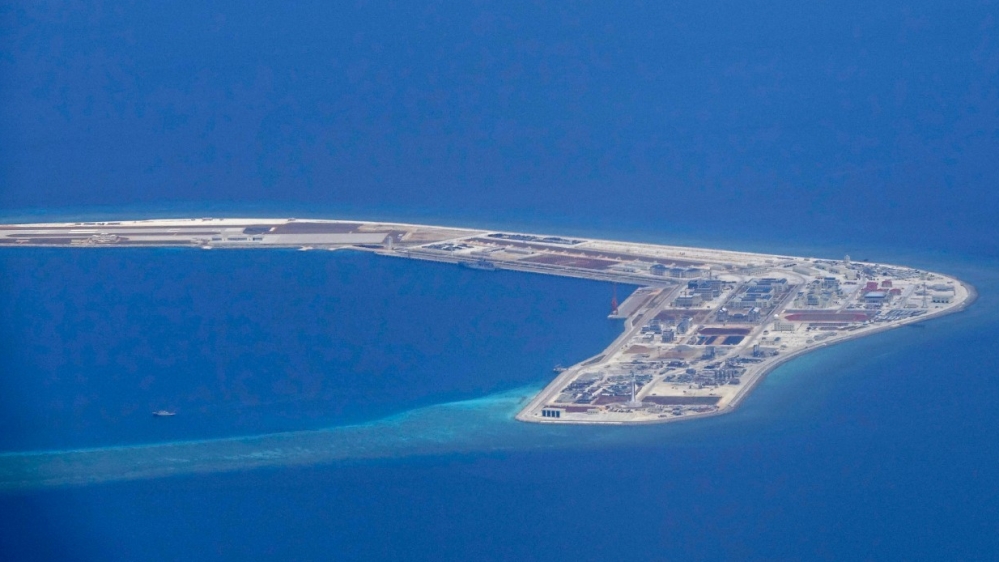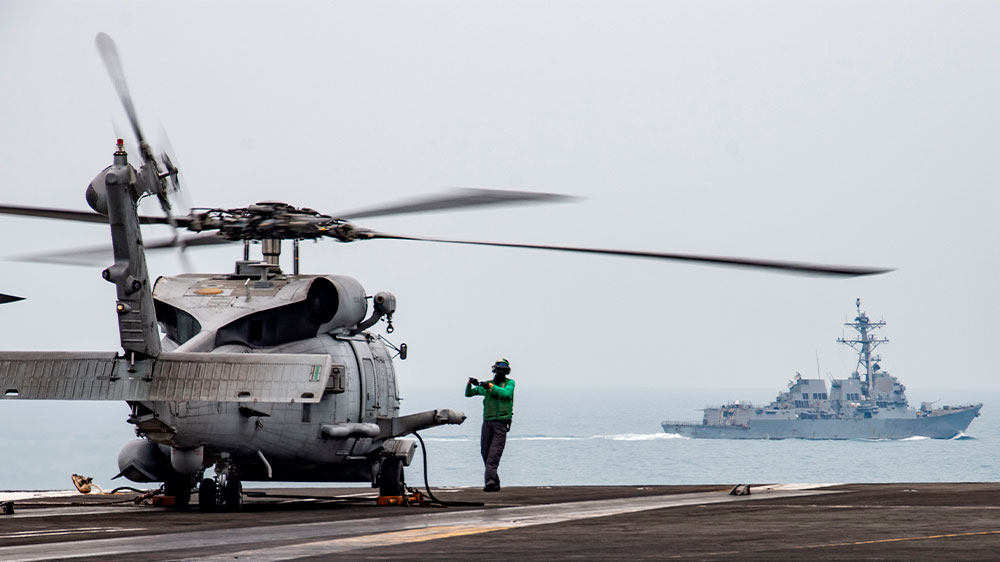Trump signs Hong Kong autonomy act, ending trade preferences
US-China tensions rise as US weighs sanctions over South China Sea territorial disputes, prepares crackdown on finances.

US President Donald Trump on Tuesday signed into law the Hong Kong Autonomy Act passed by the United States Congress that imposes sanctions on Chinese banks doing business with Chinese officials behind Beijing’s security crackdown on Hong Kong.
“We’ve all watched what happened, not a good situation. Their freedom has been taken away, their rights have been taken away,” Trump said of Hong Kong citizens.
Keep reading
list of 4 itemsJapan, Philippines, US rebuke China over ‘dangerous’ South China Sea moves
Biden, Japan leader Kishida announce stronger defence ties in state visit
China’s Xi says outside interference can’t stop reunion with Taiwan
The bill imposes sanctions on entities that help violate Hong Kong’s autonomy and financial institutions that do business with them.
In addition, Trump signed an executive order revoking special trading status the US provided Hong Kong since 1997 when it reverted to China’s control under a promised “One Country, Two Systems” principle.
“A lot of people will be leaving Hong Kong I suspect,” Trump said in remarks at the White House.
|
|
The US-China relationship has grown increasingly tense over China’s handling of the novel coronavirus and its tightened grip on Hong Kong. Trump has blamed Beijing for the pandemic that is sweeping the US and has directed his administration officials to roll out a series of legal and economic measures to punish Beijing.
Trump, who faces re-election in November, is seeking to contrast his polices towards China as tougher than those of his Democratic presidential rival Joe Biden.
Earlier on Tuesday, Secretary of State Mike Pompeo expressed “grave concern” over China’s labelling of elections in Hong Kong and a senior US diplomat for East Asia said Washington could respond with sanctions against China for coercion in the South China Sea.
“We note with grave concern Hong Kong Chief Executive Carrie Lam’s threat that this primary may have violated Beijing’s new ‘national security’ law for the territory, once again demonstrating the Chinese Communist Party’s fear of democracy and its own people’s free thinking,” Pompeo said in a statement issued by the US Department of State.
China has declared voting by more than 600,000 people in primary elections held by Hong Kong’s pro-democracy parties over the weekend “illegal”.
“We will be watching developments closely, especially as the September 6 Legislative Council elections draw closer,” Pompeo said.

Separately on Tuesday, a senior US diplomat for Asia said US sanctions on China over its territorial claims in the South China Sea are a possibility.
“Nothing is off the table … there is room for that,” David Stilwell, the assistant secretary for East Asia, told a Washington think-tank when asked if sanctions were a possible US response to Chinese actions.
Stilwell spoke a day after the US rejected China’s claims to offshore resources in most of the South China Sea as “completely unlawful”, a stance Beijing said raised tensions in the region
Washington has long opposed China’s expansive territorial claims in the South China Sea and has sent warships regularly through the strategic waterway, through which about $3 trillion of maritime trade passes each year.
China claims 90 percent of the potentially energy-rich sea, but Brunei, Malaysia, the Philippines, Taiwan and Vietnam also claim parts of it. Beijing has built bases atop atolls in the region but says its intentions are peaceful.
Monday’s announcement by the US was the first time the US has declared Chinese claims illegal.

Greg Poling, a South China Sea expert at Washington’s Center for Strategic and International Studies, said declaring Chinese claims illegal opened the way for a tougher US response, such as through sanctions, and could also lead to more US naval presence.
In Beijing, Chinese foreign ministry spokesman Zhao Lijian condemned the US move, saying it “destroys regional peace and stability and is an irresponsible act”.
Stilwell said the tougher US position meant “we are no longer going to say we are neutral on these maritime issues”.
“When a [Chinese] drilling rig plants itself in Vietnamese or Malaysian waters, we’re going to be able to make a positive statement,” he said.
Stilwell had a particular warning over Scarborough Shoal, a strategic outcrop 200 km (124 miles) from the Philippines that China seized in 2012 and that is claimed by Beijing and Manila.
“Any move by [China] to physically occupy, reclaim or militarise Scarborough Shoal would be a dangerous move … and would have lasting and severe consequences for [China’s] relationship with the United States, as well as the entire region,” Stilwell said.

Adding to the escalating tension, China announced sanctions on a US arms manufacturer and the Trump administration moved towards cutting off access for Chinese companies to US capital markets.
China’s Foreign Ministry said on Tuesday that the government would put sanctions on Lockheed Martin for involvement in the latest US arms sale to Chinese-claimed Taiwan.
The company is the main contractor for a $620m upgrade of Taiwan’s Patriot surface-to-air missiles. China strongly opposes all US arms sales to democratic Taiwan, saying it is an interference in internal Chinese affairs.
Looking ahead, the Trump administration is poised to scrap a 2013 agreement between US and Chinese auditing authorities that allows Chinese companies to list shares on US stock exchanges, a senior State Department official said.
The US auditing watchdog, known as the Public Company Accounting Oversight Board, has long complained of China’s failure to grant requests for audit reviews, meaning scant insight into the book-keeping of Chinese firms.
“Action is imminent”, Keith Krach, US undersecretary for economic growth, energy and the environment, said.
“This is a National Security issue because we cannot continue to afford to put American shareholders at risk, to put American companies at a disadvantage and allow our pre-eminence of being the gold standard for financial markets to erode,” Krach told the Reuters news agency on Monday in an emailed response to questions.
China’s commerce ministry also said on Tuesday that a State Department “warning” on July 2 to US companies of risks of working in the western Xinjiang region of China, where Uighurs are being detained in camps, had destabilised the global supply chain.